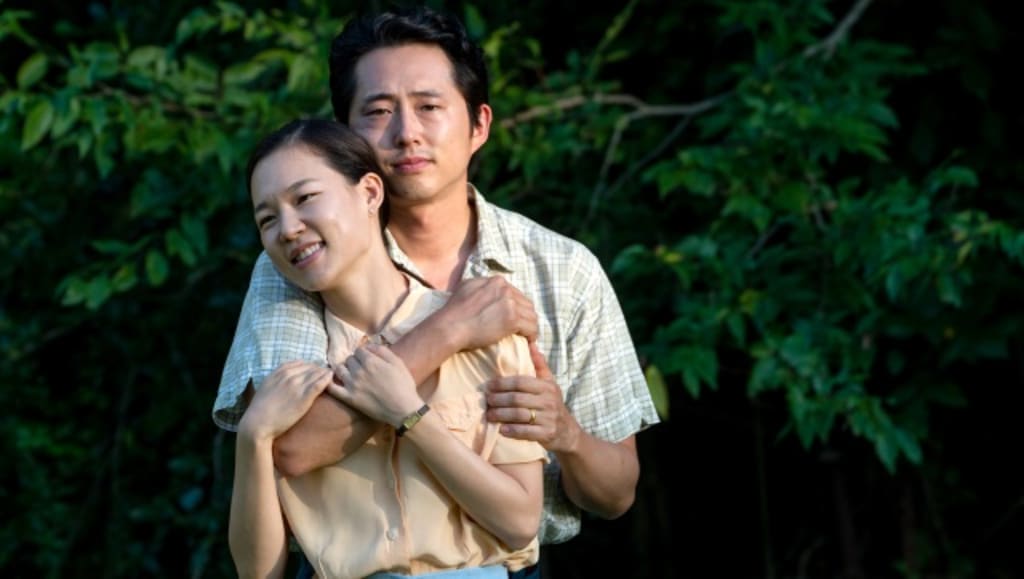Minari movie review
Intimate, poignant portrayal of a Korean immigrant family's strife with its American dream

Start writing... Stitched together in an effortlessly organic manner, Minari unfolds as a series of beautifully observed vignettes of a Korean immigrant family trying to stake their claim for a piece of the American dream.Minari is writer-director Lee Isaac-Chung's distilled version of his own childhood growing up in rural Arkansas in the 1980s. Fittingly, the film feels like flipping through a scrapbook of episodic memories and formative experiences. Stitched together in an effortlessly organic manner, it unfolds as a series of beautifully observed vignettes of a Korean immigrant family trying to stake their claim for a piece of the American dream.Hoping to run his own farm, Jacob Yi (Steven Yeun) moves his wife Monica (Yeri Han) and two children, Anne (Noel Kate Cho) and David (Alan Kim), to a plot of land in Arkansas. Monica isn't too happy about living in a trailer in the middle of nowhere and makes her feelings known right away. This marital tension simmers throughout the film, and is realised in the occasional conflict.Gloating “Korean people use their heads” to his son, Jacob ploughs his own furrows. Dispensing abstract belief in God for the American Dream, he digs his own well, takes out a loan to buy a tractor, and grows Korean vegetables to sell them to the expanding Korean population in nearby cities. But as he finds himself over his head, not to mention his family's budget, Monica must take matters into her own hand to ensure the family comes before the farm. For Jacob to be a dreamer, Monica must be a realist.The family dynamics change instantly on the arrival of Monica's mother Soon-ja (Youn Yuh-jung). The veteran Youn is a delight to watch, especially when paired with newbie Kim, whose performance is unstudied but no less affecting. In the beginning, David's relationship with his grandma is testy in an endearing way, but it inevitably softens over their shared love for pro-wrestling, “mountain water” (Mountain Dew) and card games. Chung frames their clashes like comedic interludes, but without losing any of the film's emotional hold over us.Authenticity is built on achingly intimate details. When Soon-ja arrives all the way from South Korea, she brings with her bags packed with Korean chili flakes and dried anchovies. Overcome with emotion, Monica tears up. There is a familiarity to this routine that will resonate with anyone who has ever moved to a new city or country, and can't find the grocery essentials from back home. For Monica, it is an emotional moment because, for once, someone thought of her. The invisible workload of being a supportive wife to Jacob and mother to Anne and David has relegated her own dreams and desires to second-class status, like in most traditional Asian families. Her mother bringing her anchovies is someone recognising her existence, and thus her needs. Yeun, Youn and Kim may have attracted everyone’s attention this awards season, but it's Han's performance which lingers longer because it’s impossible to watch her and not weigh our own relationships with our mothers.Serving as the central metaphor is the herb which gives the film its title. Soon-ja takes David to plant some minari seeds near a creek on the edge of their homestead. Minari is a perennial herb known to grow on all terrains. More importantly, after it dies in the first season, it returns stronger in the second, revitalising the water and soil around it. It perfectly sums up the immigrant experience, the sacrifices made by the first generation to ensure the second thrives. As the metaphor takes root in the narrative, the Yi family too slowly find the strength and resilience to carve out their place in America.Motifs are drawn from classical elements. Fire, water and earth are a disruptive as well as productive influence, symbolising the challenges of acclimating to a new country. Jacob's plants wither without water, and the family turns to the creek, where the minari is planted, for water to run their own home. Fire destroys their barn, but also helps the Yi family hit the reset button. And what is Minari about if not taming the land to reap its rewards?David lashes out at Soon-ja for not acting like “a real grandma.” His conception is entirely American: one who bakes cookies, not one who feeds him yucky potions for his weak heart. Most certainly, not one who wears men's underwear and swears during card games. When Jacob and Monica get into a heated argument, the children fling paper planes with “Don't fight” written on them. When Soon-ja reminds David and Monica of their favourite ballad, both appear to have forgotten it entirely. It's an example of how their American future is slowly supplanting their Korean past.






Comments
There are no comments for this story
Be the first to respond and start the conversation.